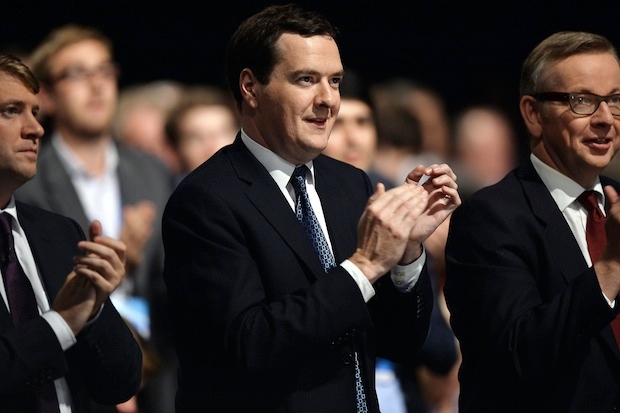The Chancellor’s Autumn Statement is looming on the horizon, and the Free Enterprise Group, the loose alliance of backbench Tory MPs, laid out its proposed economic reforms at the Institute for Economic Affairs earlier today. The group sees the economic recovery as an opportunity to address some of the underlying challenges in the British economy before the general election. The group urged the Chancellor not to play safe, and proposed seven stimulatory tax cuts to benefit those on low and middle incomes: the so-called ‘squeezed middle’.
1). Create a single VAT rate of 15% – revenue neutral (Kwasi Kwarteng)
2). Move the majority of the cost of green levies onto general taxation with the aim of abolishing those taxes in the long run – £2.8bn cost (David Ruffley)
3). Abolish Air Passenger Duty – £1.5bn cost (Kwasi Kwarteng)
4). Abolish Stamp Duty on land for properties under £500,000 to boost home ownership among the aspiring classes – £2.4bn cost (Dominic Raab)
5). Abolish employers’ National Insurance contributions for unemployed under 25s, a ‘fair and equitable’ solution to youth unemployment – £0.29bn cost (Brooks Newmark)
6). Freeze business rates for three years – £3.8bn cost (Dominic Raab)
7). Take ordinary workers out of higher rate income tax by raising the basic rate limit from £32,010 to £40,000 (plus the personal allowance of £9,440) – £5bn cost (Kwasi Kwarteng)*
The measures would cost £15.79bn. Funding options include: removing the ring-fencing of the health and education budgets (£7bn). Cutting the number of government departments from 20 to 11 (£8bn)**, introducing a three-year cash free of benefits (excluding pensions) (£3.4bn), means testing of ‘grey benefits’ such as the winter fuel allowance (£2bn), integrating Child Benefit with Universal Credit (£4.5bn) and abolishing housing benefit for under 25s (£1.8bn).
*Kwarteng says that his constituents are very keen on being lifted out of higher rate income tax, which is unsurprising. However, this is an important consideration, especially in marginal constituencies where the Tories are under pressure.
**This is Dominic Raab’s hobby-horse. He suggests that the Business Department’s essential functions should be moved to the Treasury; that DfID should be brought back (with all of its funding) into the Foreign Office; that Home and Justice should remerge; that DECC and DEFRA should merge; that the regional offices and the Transport department should merge; and that DCMS should be abolished.
PS: The discussion raised many salient points around and beyond the proposals. Here is a brief summary:
1). The Free Enterprise Group have state spending in their sights. There was general agreement that the coalition had not cut spending, and that debt – state, consumer and banking – poses a threat to the British economy’s competitiveness. The national debt is deterring investment in the private sector, especially away from London and the south east, because companies are wary of the uncertainty around fiscal policy: taxes may have to rise in order to service ever-expanding debt. The boost in tax receipts caused by the recovery must not be sacrificed in such a way; it is vital that state spending and debt begin to fall.
2). The group is interested in reforms that are politically possible – in its view. The group recognise that the Tories don’t have much of a retail offer for 2015, and time is short. So, it has only recommended what it thinks the coalition can deliver. This is why no proposal was made to cut capital gains or inheritance tax. The same is true of infrastructure projects that might stimulate the economy. The panel was unanimous in its view that airport capacity must be increased and that road and rail networks must be upgraded; however, it regretfully conceded that these projects are politically impossible at present.
3). The coalition’s economic policy needs to be more conservative. The group was openly hostile to Nick Clegg’s latest push to raise the personal allowance to £10,500. Dominic Raab described it as a regressive retail offer that would cost, according to the Resolution Foundation, £8bn. Meanwhile, David Ruffley (Ken Clarke’s former SpAd) launched an effective political assault on the policy: low-tax parties should not take specific groups out of income tax because it weakens general support for tax cuts across the economy. It would be better, he argued, to trim a penny or two off income tax, as Tory chancellors used to do. He refashioned the Lawsonian mantra: ‘It’s time we returned to the politics of a penny off’.
4). The need for certainty and simplicity in the tax system. The group is adamant that the complicated tax code is deterring investment. The best way to increase certainty about the tax code is to simplify it and reduce rates. For example, Dominic Raab hopes to abolish business rates, while David Ruffley’s long-term aim is to introduce flat 20% rates on taxes such as CGT, IHT, corporation tax and NI.
5). The road to Downing Street is paved with tough welfare policies. The panel made much of a poll by conducted by Andrew Cooper in which 80% of respondents who supported the cap (79%) want the welfare cap to be lower than £26,000 before tax. Anecdotal evidence from constituencies supported the poll findings – it seems that the ‘squeezed middle’ don’t much care for subsidising what they regard as fecklessness. But, while the panel agreed that the cap should fall, there was disagreement about how far. Tethering the cap to the value of the minimum wage after tax may prove to be a workable solution; but it’s early days yet.
6). The most impressive thing about the Free Enterprise Group is that it is self-critical. There was a telling exchange between Kwasi Kwarteng and Brooks Newmark over VAT. Kwarteng is in favour of abolishing exemptions because it will raise £5bn that could be used to help the vulnerable. Newmark cautioned against such radicalism, recognising that the policy would be nigh-on impossible to sell.






Comments